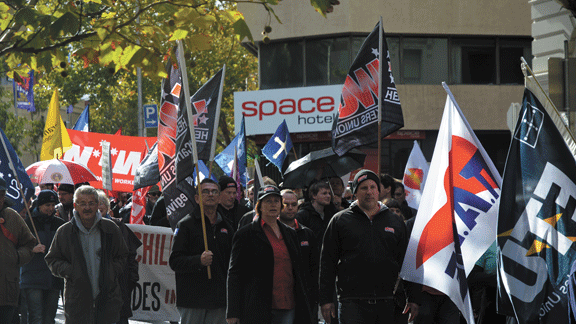Building a union fightback

Thursday 12 June will be the most significant day so far in the campaign against the Abbott government’s vicious budget. Thousands of organised workers across Victoria will walk out of our workplaces, rallying at Trades Hall at 10:30am before marching through the streets of Melbourne.
At midday, delegates from every union in New South Wales will meet at the Masonic Centre in Sydney to discuss the union response to the budget.
These developments are a significant step forward. Since the budget, the government has been plagued by plummeting opinion polls and a chorus of protests from students and others. But organised workers have the capacity to turn these political headaches into a real nightmare for Abbott.
History shows that any campaign or social movement is at its strongest when it gets the active backing of unionised workers. Student rallies can put sustained protest on the political agenda; workers stopping production have the capacity to turn protest into effective resistance.
Big business hopes to profit handsomely from the political agenda laid out in the budget. Stopping work threatens these profits, as well as disrupting business as usual, which is why a campaign of strikes is the most powerful weapon our side has.
If this enormous power is to be harnessed to derail the government’s agenda, a serious call-out to unionised workers has to be backed by a serious organising effort. These first union actions will have to develop into a sustained campaign of strikes and demonstrations.
The action called so far falls short of this.
In Victoria the main construction union, the CFMEU, has announced that it will be calling out “substantial delegations” of workers from major commercial construction sites, rather than shutting the industry down. A similar approach seems likely in other sectors, with some well-unionised workplaces striking, others sending delegations and others again sending only individual delegates.
As well as agitating in our unions for the most serious possible strike action, everyone who is serious about fighting the Liberals has to do what we can to maximise attendance at the Trades Hall rally.
In a great many workplaces, traditions of industrial action – especially outside bargaining times – have been seriously eroded. Many newer workplaces have never even had an active union presence. In these workplaces, getting workmates to a lively city rally can be a first step, small but vitally important, in rebuilding the political and industrial traditions we will need to resist the Liberals – now and in the battles to come.
A serious effort to mobilise off-shift workers and delegates could still result in a significant mobilisation, and would prepare the ground for further action. Workplace meetings about the issues at stake, alongside phone arounds, petitions and leaflets, can also play this role.
The most impressive one-day rally, even backed by strike action, will not be enough to stop the Liberals. Only a sustained campaign of protests and strikes can do that. But the biggest possible turnouts to the 12 June events, and a big turnout to the union protests called for Melbourne and Sydney (and hopefully other cities) on Sunday 6 July would be important steps, showing that our side is serious about a fight.